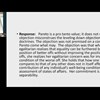defused

Richard Arneson: Should we reward the deserving? Some puzzles
Do plausible fundamental principles of justice incorporate the idea of rewarding the deserving? Utilitarianism is famously indifferent between a world in which saints fare badly and scoundrels fare we
Richard Arneson: Should we reward the deserving? Some puzzles
Richard Arneson is a political philosopher with a special interest in theories of social justice. AbstractDo plausible fundamental principles of justice incorporate the idea of rewarding the deserving?
Deep learning diffusion by infusion into preexisting technologies - Implications for users and society at large
in: Technology in Society. 63, 101396 Abstract:Artificial Intelligence (AI) in the form of Deep Learning (DL) technology has diffused in the consumer domain in a unique way as compared to previous gene, i.e., by being added to preexisting technologies that are already in use. We find that DL-algorithms for recommendations or ranking have been infused into all the 15 most popular mobile applications (apps) in the U.S. (as of May 2019). DL-infusion enables fast and vast diffusion. For example, when a DL-system was infused into YouTube, it almost immediately reached a third of the world's population. We argue that existing theories of innovation diffusion and adoption have limited relevance for DL-infusion, because it is a process that is driven by enterprises rather than individuals. We also discuss its social and ethical implications. First, consumers have a limited ability to detect and evaluate an infused technology. DL-infusion may thus help to explain why AI's presence in society has not been challenged by many. Second, the DL-providers are likely to face conflicts of interest, since consumer and supplier goals are not always aligned. Third, infusion is likely to be a particularly important diffusion process for DL-technologies as compared to other innovations, because they need large data sets to function well, which can be drawn from preexisting users. Related, it seems that larger technology companies comparatively benefit more from DL-infusion, because they already have many users. This suggests that the value drawn from DL is likely to follow a Matthew Effect of accumulated advantage online: many preexisting users provide a lot of behavioral data, which bring about better DL-driven features, which attract even more users, etc. Such a self-reinforcing process could limit the possibilities for new companies to compete. This way, the notion of DL-infusion may put light on the power shift that comes with the presence of AI in society.
Jenny Andersson: What is futures studies?
Jenny Andersson, Researcher at Sciences Po & Co-Director of MaxPo in Paris. ABSTRACTAt this seminar, Jenny will present her new book The future of the world. Futurology, futurists and the struggle f
The fast and furtive spread of AI by infusion into technologies that we already in use – a critical assessment
In Hanemaayer, A. (editor) Artificial Intelligence and Its Discontents. Palgrave. Abstract AI has often reached individuals covertly, rather than by their own choosing. Standard automatic version update
Completed: Mission: Artistic Director
This project considers artistic leadership and managerial skills in Swedish theatre, a subject which has been debated both publicly and internally the past few years.
Simulating the Future Pension Wealth and Retirement Saving in Sweden
In this paper, wealth consequences of the Swedish pension system in the transition from a defined benefit to notional defined contribution system are simulated with almost exact institutional detail,
Mike Otsuka: How to guard against the risk of living too long: the case for collective pensions
Mike (Michael) Otsuka, Professor of Philosophy at London School of Economics ABSTRACTIn this paper, I defend the realization here and now of a type of occupational pension that is collective rather tha
A popular misapplication of evolutionary modeling to the study of human cooperation
Evolution and Human Behavior, Volume 38, Issue 3, Pages 421–427. Abstract To examine the evolutionary basis of a behavior, an established approach (known as the phenotypic gambit) is to assume that the b
Demographic and Educational Success of Lineages in Northern Sweden
Population and Development Review, Vol. 43, Issue 3, pp. 491-512, https://doi.org/10.1111/padr.12091 REPRODUCTIVE SUCCESS AND socioeconomic status are inherited across generations, both in contemporar








